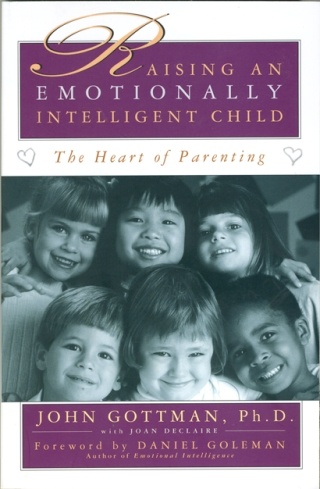Every parent aspires to raise happy, well adjusted, prosperous children. What that looks like and how we get there, though, is a matter of debate.
In his book, “Raising an Emotionally Intelligent Child,” John Gottman offers up his theory, based on decades of his own research, that “emotional coaching” is as essential to our children’s bright futures as any intelluctual skill bestowed through formal education. Gottman lays out five steps to follow when emotionally coaching a child, which essentially boil down to taking every feeling your child has seriously.
While Gottman clearly makes a distinction between enforcing boundaries and rules, he believes that it is also important to understand your child’s perspective. Doing this results in many positive outcomes. First, your child will learn that her feelings are important, resulting in a higher self-esteem. Second, your child will feel that she has been truly understood and that she matters. This will lead to a deeper bond between parent and child, and this deeper bond will motivate the child to adhere to and accept the family’s values, morals and perspectives.
Once this foundation has been laid, parents can set limits while problem solving, thereby reducing stresses to the child’s life. The theory is that by instituting the five steps regularly and consistently, you teach your children how to deal with their emotions in a healthy and productive way. Like any skill, once the child learns these lessons, they are able to regulate themselves without a parent’s guidance.
Based on scientific findings, Gottman shows that children who have been successfully emotionally coached can soothe themselves through difficult emotional journeys, enjoy better friendships, do better in school, have fewer colds and illnesses, and handle divorce and argument better. He goes on to argue that there are long term benefits like stronger marriages for themselves and longer life spans.
I thought that this was a beneficial book to read for many reasons. The concept of emotional coaching is well laid out and easy to follow. The five steps to emotionally coach your children are also very easy to follow and implement.
From reading this book, you will easily know if this theory is for you or not. The author offers a detailed assessment to determine the type of disiplinarian you are based on your beliefs about emotions. I found this section fascinating, informative and surprising. You will understand a lot more about the way you parent by reading this section alone. There is a great discussion about how to coach your kids in a turbulent marriage or through the midst of divorce. It gives a lot of hope that kids can come through these situations relatively unharmed. Finally, there is an impressive discussion about fathers being crucial to our children’s emotional development and the reasons why.
The only aspect of the book that I didn’t care for was the example dialogues the author uses. While I understood the spirit that he was trying to demonstrate, the actual words seemed stiff and not genuine.
On a personal note, I have been trying to adhere to the five basic steps laid out in this book and I must say, it is a herculean effort to take every emotion my 2-year -old daughter expresses seriously. But I have noticed that if I do it consistently, for even just a few days at a time, I have noticed a positive change — she seems more bonded to me; she seems more secure; and she seems more trusting. If anyone else has any comments about their own personal experience using this technique, I would be interested to know.
This book receives a rating of 4: So enjoyable, you make time to read.
Reviewer Dina Parker would like to hear from you! Send her your reading tips, hints and comments at dinaparker@centurytel.net.


